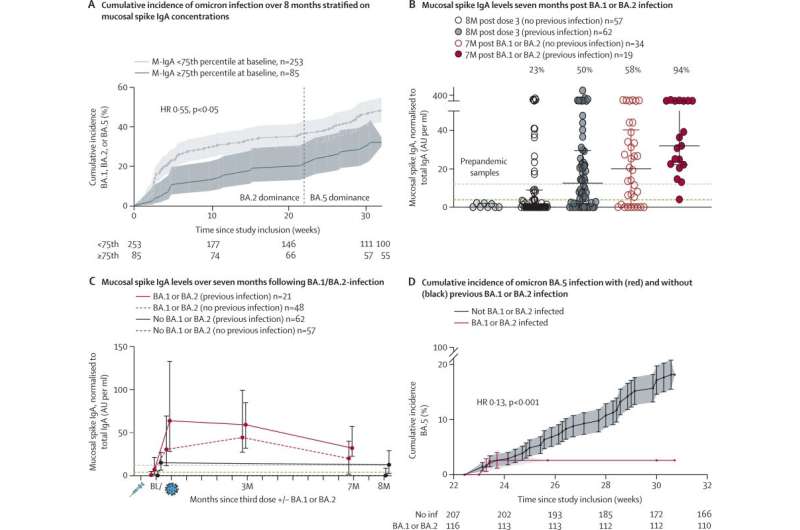This article has been reviewed according to Science X's editorial process and policies. Editors have highlighted the following attributes while ensuring the content's credibility:
fact-checked
peer-reviewed publication
trusted source
proofread
Airway mucosa antibodies durably protect against COVID: Study

High levels of mucosal IgA antibodies in the airways protect against SARS-CoV-2 infection for at least eight months. Omicron infection generates durable mucosal antibodies, reducing the risk of re-infection. These are the findings of a study published in The Lancet Infectious Diseases by researchers at Karolinska Institutet and Danderyd Hospital in Sweden. The results raise further hope for the feasibility of future nasal vaccine platforms to protect against infection.
The COMMUNITY study enrolled 2,149 health care workers in the spring of 2020 at Danderyd Hospital, Sweden. Study participants and their immune responses against SARS-CoV-2 have since then been followed through regular samplings from blood and airways along with PCR screenings.
A sub-study during January and February 2022 screening 338 triple-vaccinated health care workers for SARS-CoV-2 infection found that participants with high (upper quartile) mucosal IgA antibodies in the airways had half the risk of being infected with omicron compared to those with no or low levels of antibodies in the airways. The researchers have now continued to follow these participants and find the protection to be durable over at least eight months.
90 percent lower risk of re-infection
Participants who were infected with omicron had a more than 40-fold increase in mucosal IgA antibodies, even if the infection was mild. The current follow-up study now reveals a good durability of these antibodies, and a majority of participants still have protective levels seven months after the infection. Those who were infected with the omicron variants BA.1 or BA.2 had a 90 percent lower risk of being re-infected with the omicron variant BA.5.
"Antibodies in the blood protect from severe disease, but if we aim to limit infection, viral transmission and the emergence of new SARS-CoV-2 variants, we need to reinforce our immunity at the mucosal surface, which is the viral point of entry," says Charlotte Thålin, M.D. and associate professor at the Department of Clinical Sciences, Danderyd Hospital, Karolinska Institutet who led the study.
"This is not achieved by currently employed intramuscularly-delivered vaccines. But the hope is that a nasal vaccine may generate mucosal immune responses similar to those seen after infection, and thereby block the transmission chain."
The researchers have also investigated the impact of repeated infections and found that participants with a prior SARS-CoV-2 infection generated a stronger mucosal immune response to omicron breakthrough infection.
Development of nasal vaccines
"The results show us that it is possible to recall protective and durable mucosal IgA antibody responses in the airways, and that these responses increase with the number of infections. Although these findings are not surprising, they are important for the development of nasal vaccines," says Ulrika Marking, M.D., Ph.D. student at Karolinska Institutet and first author of the paper.
The COMMUNITY study continues with regular samplings from blood and mucosa, monitoring immune responses after repeated SARS-CoV-2 infections and vaccinations. The study is being conducted in close collaboration between Danderyd Hospital, Karolinska Institutet, Uppsala University, the Public Health Agency of Sweden, KTH Royal Institute of Technology, and SciLifeLab.
More information: Ulrika Marking et al, 7-month duration of SARS-CoV-2 mucosal immunoglobulin-A responses and protection, The Lancet Infectious Diseases (2023). DOI: 10.1016/S1473-3099(22)00834-9



















